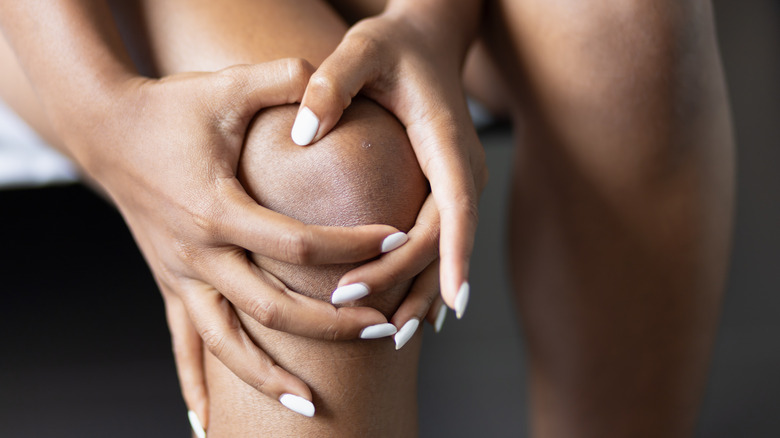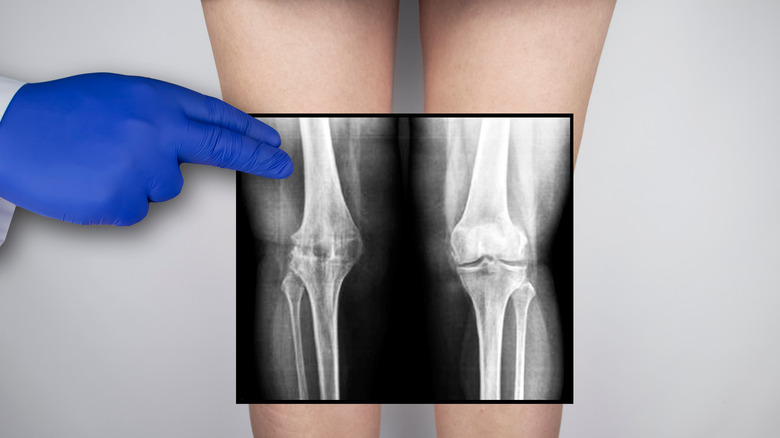What It Really Means When Your Knees Pop
Do your knees pop when you squat, run, or walk downstairs? Chances are, you have nothing to worry about. This odd symptom is called crepitus and can affect just anyone, regardless of age or fitness level. You may also hear a pop in your shoulders, elbows, and other joints.
Crepitus occurs when air bubbles develop in the synovial fluid that lubricates your joints to keep them from rubbing against each other, according to Medical News Today. These bubbles can burst and produce cracking, grinding, crunching, or popping sounds.
The exact cause depends on what other symptoms you experience. Knee crepitus accompanied by pain or swelling can indicate a more serious condition. Sometimes, it's a sign of injury, such as an ACL tear. For example, a dislocated knee cap may cause a popping sensation, inflammation, difficulty walking, and severe pain, according to the National Health Service. So, how can you tell it's time to see a doctor? And what's causing this awkward sound in the first place?
Why do your knees pop and crack?
Knee popping can have a multitude of causes, from injuries to age-related wear and tear. Orthopedic surgeon Kevin R. Stone says that cavitation, or the tiny bubbles inside the joint fluid, is a common reason (via the Stone Clinic). Crepitus can also occur when your tendons and ligaments are rubbing against a bony lump or scar tissue inside the joint. In either case, it's normal to hear popping or clicking sounds in the knee.
Sometimes, this symptom is related to the changes affecting the knee cartilage as we age. "Cartilage is typically a very smooth surface that allows for the knee to glide without any noise," pediatric orthopedic surgeon Nirav Pandya told Yahoo Life. This tissue tends to get rougher over time, causing a popping sound when you walk, run, or move around. The same can happen to any other joint, such as your hips or ankles.
Tight, weak, or misaligned muscles may contribute to this problem, too. Orthopedic surgeon Dr. Bert Mandelbaum told Prevention that it's common to hear cracking or popping sounds in the knee if one muscle is stronger or working harder than another. In the long run, these issues can lead to arthritis or premature wear and tear of the knee cartilage.
When to see a doctor for your knees
Crepitus alone isn't a reason for concern and doesn't affect physical performance. In fact, estimates show that about 99% of people experience some sort of noise in their knees (per Physiopedia). However, crepitus accompanied by pain, swelling, or limited mobility can indicate an underlying condition. Depending on your symptoms, you may be dealing with osteoarthritis, rheumatoid arthritis, runner's knee, or meniscus tears, explains Healthline.
Generally, it's recommended to see a doctor if you experience joint pain or inflammation in addition to crepitus. For example, a popping sound accompanied by swelling can indicate an injury to the meniscus or ligaments, warns the Stone Clinic. Knee osteoarthritis, on the other hand, may cause pain that worsens during physical activity, as well as swelling, limited range of motion, and stiffness (per WebMD). The risk of developing this condition increases with age.
Occasional popping in the knees doesn't require medical attention, but there are a couple of things you can do to prevent it. For starters, Dr. Michael Camp recommends in Men's Journal to focus on strengthening your glutes and the muscles around your knees. Make sure your workout includes squats, lunges, donkey kicks, and glute bridges, as well as stretching and foam rolling for the quads and hamstrings. If your symptoms persist, reach out to a physical therapist to see what you can do about it. They may recommend at-home exercises, stretching techniques, or soft tissue mobilization to improve joint function and reduce injury risk.



